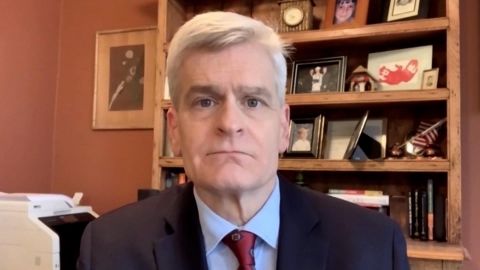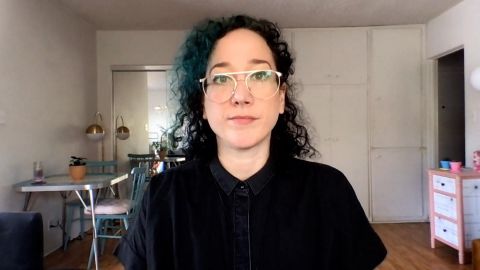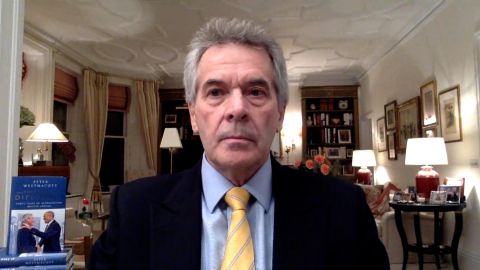Read Transcript EXPAND
CHRISTIANE AMANPOUR: Now, out of those 50 Republican senators who are in Washington, only seven, as we said, dared to cross Trump and vote to convict him this weekend. One was Louisiana Senator Bill Cassidy. The former doctor voted guilty on the charge of inciting an insurrection, knowing full well that he would face the wrath of his constituents in his deeply conservative state. Indeed, the Louisiana Republican Party has moved and did so immediately to censure Cassidy for voting his conscience. Here he is sticking to his guns and talking with our Walter Isaacson.
WALTER ISAACSON: Thank you, Christiane. And, Senator Bill Cassidy, welcome back to the show.
CASSIDY: Hey, thank you for having me, Walter. I appreciate being here.
ISAACSON: Down here, where you and I are in Louisiana, it was a really big surprise. Everybody was kind of shocked when you voted to convict. And everyone said, there’s just no political upside, no political upside. Why did he do that? So let me ask you, why did you do that?
CASSIDY: I actually think there is political upside. I took an oath to support and defend the Constitution. I take that seriously. We have more veterans per capita than almost any other state. We have three military bases. Each one of those young people who comes into the service takes that same oath. Now, as folks began to realize the facts of the story, that it was a question of subverting our Constitution, I think the political upside will say that — will be that they will see that when I take an oath to support and defend our Constitution, I mean it.
ISAACSON: I heard that you had two statements until right before the vote almost. You had a statement explaining why you were going to acquit, why you were going to convict. Tell me when you made that decision and how those two statements helped you formulate your ideas.
CASSIDY: First, the two statements, I have got a crackerjack communication team. So they said, Dr. Cassidy, we’re ready either way. And I smile, because the enterprising photographer using a telephoto lens to spy on me got misdirected. I was, again, an impartial juror. And when they were making summation statements, I made a decision to listen to those summation statements. And as I listened, of course I had a movement in my mind before then, but that’s when I said, OK, boom, we know what we’re doing. Let’s go forward. Did I have a — did I have — had I worked it up beforehand? Yes. Could I have said, my gosh, here’s something I hadn’t considered at the end? Yes. But, at the end, everything I considered pointed towards not putting one person above the Constitution.
ISAACSON: What Trump did was two different things. One; is that he tried to undermine the credibility of the election, kept saying it was stolen, saying it was false, saying that voting machines have been hacked by God knows whom or whatever. And then, secondly, he encouraged people to march to the Capitol and somewhat, in inciting words, to fight in the Capitol. Which of those two things, or both of them, do you think caused you to want to vote to convict him?
CASSIDY: I thought really long and hard. I would sit with my staff and just start typing out ideas, because typing out ideas forces me to crystallize. And I don’t think it’s a single thing that you could point to, because any single thing you could point to and say it proves he’s not guilty. But if you look at the continuum, again, the — Rudy Giuliani going to federal court saying, no, Honor, there is no fraud, and walking outside the court and claiming there was fraud, of continuing to castigate state officials, most of whom were Republican, to overturn the results of their election, all the way up to taking that rally scheduled for after the presidential inauguration to the date of certification, advertising for people to come there, stirring up emotion, sending them to the Capitol. And then, once we knew the capital was breached, not telling them to go home, rather still tweeting incendiary remarks and making phone calls. This is key, making phone calls to try and stop the certification. Now we have a motive. And then that gives light to the method. Any one of those by itself would not convict. In a continuum, they absolutely do.
ISAACSON: You have already been censured by our state Republican Party, but you have probably gotten a whole lot of messages, text messages, e-mails, and maybe run into people. Tell me what you’re really hearing.
CASSIDY: I am hearing everything. Friendships that have now ended, to folks who said, I am going to support your next campaign. Whatever it takes, I will support you. Now, ultimately, though, it’s just a question of how you come down. Do we put one person above the Constitution or do we say, no, everybody is subject to the same Constitution and that’s what we adhere to? I think, as the facts are known, more and more folks will move to that position, not the former position. I expect support to grow.
ISAACSON: You say that putting Trump above the Constitution, it’s not only wrong, you say is not conservatism, is not Republicanism.
CASSIDY: No, not at all. Conservatism is — again, constitutional conservatism is about putting the Constitution first. But there’s many aspects in this whole process, which were anti-conservative. The president trying to have override state officials, that’s against states’ rights. It’s against the founding principle of federalism. That was one example. And I could go on. But suffice it to say, I feel so conservative at this moment. And I wonder about those folks who are putting Trump above the Constitution, why they feel so conservative.
ISAACSON: What happens when you tell people that, when they’re when they’re angry at you, and you push back? Are they listening?
CASSIDY: Some do. One fellow wrote me a note: I’m disappointed in your vote. I wrote him back. I said: This is why. He wrote me back immediately: Thank you for reply — your reply. I understand. I’m with you. Now, others, they are upset about everything I’m doing. They’re upset that I support having a commission to look at the events, so that we can make sure it doesn’t happen again. But, again, if you put the Constitution above all things else, then I think you moved where I am.
ISAACSON: Minority Leader Mitch McConnell, in his speech slamming Trump, after he had voted to acquit Trump, implied that there should be criminal charges, that there are all sorts of jurisdictions in this country that should be holding Trump to account. You have called for a commission. I know you’re a doctor, not a lawyer, but tell me whether you think it’s wise to have prosecutions now of Donald Trump.
CASSIDY: No person should be above the law. No one should be hounded by the law. No one should be hounded. But no one should be above. I will leave it up to prosecutors to assume that if Walter Isaacson or Bill Cassidy or Mitch McConnell or Barack Obama or Donald Trump had done the same thing, should they be prosecuted? If so, he should be. If not, he shouldn’t. On the other hand, I think, more importantly, is, we have to establish the principle — I will say it once more — no one person is above the Constitution. And then, as Republicans, we have got to start advocating for our better ideas, which I can give you a list of them through history, and including right now, better ideas that give us as a better alternative, as we move beyond President Trump into our future.
ISAACSON: Tell me about that commission that you’re supporting. It’s like a 9/11. Commission we had back then. What is it really supposed to do? Is it supposed to look at whether or not people should have voted to not accept the Electoral College?
CASSIDY: I think there was so much that we have to look at. One, we know people should have voted to accept the Electoral College. And I can go into that, if you have got another hour. But what were the security breakdowns? Why was there only a thin line of Capitol Police with a thin barricade? Why weren’t there mounted police, like we have at Mardi Gras, Walter, in which those mounted police just used the force of that horse to press back on people? It really is effective in crowd control. I kept on thinking; we need the New Orleans Police Department up here on their horses. And so there’s going to be a lot to investigate, including the events surrounding the president. But I am particularly interested in the security. I don’t want to see our Capitol Police tossed out to a mob again.
ISAACSON: You did — you raised the point of the people who voted against certifying the electoral votes as part of our constitutional transition of power. That includes people like Josh Hawley and Ted Cruz, who led the fight to not certify the Electoral College votes. Do you think they’re partly responsible for what happened?
CASSIDY: I don’t speak for other people. I have learned long ago not to try and guess emotion or thought, unless I have facts upon which I can base that inference. But if you — in my own perspective, if you look at the history of challenging votes, it’s when there was an alternative slate and which there was bona fide evidence, not just hearsay, but evidence of why votes should not be certified. Now, I accept that there are people that voted in good conscience not to certify. I don’t doubt that. And my own perspective, the conservative thing to do was to accept the states’ officials’ certification and to go forward.
ISAACSON: There are others who feel the way you do in the Republican Party. In fact, I would bet, not knowing if it’s true, that there’s 15 or 20, including Mitch McConnell, who felt that what Trump did helped subvert the Constitution. You just listen to Leader McConnell’s speech after he voted to acquit. What was it in you that caused you to end up voting to convict, when you know that so many others in your party felt the same way, but didn’t do that vote?
CASSIDY: Again, I cannot speak for them. But when I was a little boy growing up, I would read these history books about the men and women who did so much to contribute to our country. And, of course, we have quoted Benjamin Franklin, a republic if you can keep it; you know that better than anybody. But the — all the others who along the way contributed to actually our country being a bright shining light upon the hill. Now, it is my responsibility — it is our responsibility to continue that. So that, 100 years from now, we are still that bright shining light. In my sense, voting to support the constitution over a single individual and frankly, feeling like that reflects conservative values is part of my role in that line for 100 years from now.
ISAACSON: Is Trump still the de facto head of the Republican Party, because he wasn’t convicted? And if so, how does the party go ahead?
CASSIDY: No. The party — his influence begins to decrease. And the party goes — goes ahead — look, we got to win elections. Now, we win elections by going to those folks who may vote Democratic or may vote Republican, and convincing them to vote Republican. And we that by showing that we put their interests above the interest of anything else except our Constitution and that we are going to make their lives better, our country’s future better, that’s how we win. Ideas lead our party.
ISAACSON: Many years ago, you switched, like a lot of people in Louisiana, from the Democratic to the Republican Party. If the Republican Party stays a party of Trump and him personally, what options do you have? Is there an Independent Party that could form or might you switch parties?
CASSIDY: I am — first, let me tell you why I stopped being a Democrat if you will. I worked in a public hospital for the uninsured and those on Medicaid, and politicians controlled our budget. And I always noticed that for the politician, my patients were the ones who were their lowest priority. They weren’t loud, they were poor. And so they had long lines and broken-down facilities and doctors and nurses working hard, but never able to quite bring it to where it should be. But if they got a job and they got insurance, they went down the street to the private hospital, and all of a sudden, they were the focus of attention, not an afterthought. Which party is more about small business creating jobs? The Republican Party. Which party is more about people having opportunity, of dependency? The Republican Party. I’m not going back to the Democratic Party. No offense, Walter, because I’m about that individual having all the opportunity and control over her life that she absolutely can. Now, that said, I also don’t see this party, Donald Trump. Our party is a party of ideas. And will there be tension? Absolutely. But again, if the first idea is that nobody is above the Constitution, and the second idea is that we’re going to work hard for the future of our country, then I think we can make this party in the grand old party a dove of Constitution, our country and our future.
ISAACSON: You have the chance and you have already done it some, of being part of a, I don’t know what the phrase would be, but a moderate centrist group within the Senate trying to be pragmatic and get things done, work with the Biden administration but temperate. Tell me, do you think that people like yourself, that they’ll be enough people in center, including Republicans, that will have some pragmatic solutions? And if so, how will that affect, say, the COVID Relief Bill and other parts of the Biden plan?
CASSIDY: I am going to pushback just a little bit because it might be moderate in the sense that we’re willing to meet with the other side. But if you look at those who are in our group, it’s from the very conservative to the very liberal, but we can find common ground. So perhaps common ground is a better term, because it won’t misrepresent people on either side. I’m hoping we can something. Frankly, it depends somewhat upon those Democrats who are closer to the middle. If they just go lock step with the Biden administration and jamming things through on reconciliation, we are going to waste so much federal dollars on things that have no lasting impact that our country will be harmed. If those Democrats are closer to the center, say, wait a second, instead of just putting money out there for, you name it, almost six times more for schools than are currently indicated, instead of maybe building highways and roads, instead of expanding broadband internet so that kids in the rural areas will have access to online courses to improve their education, we need to go on that direction not, let’s just spend the money because we have a need to spend money, period, end of story, no reason for it. If we do that, we can moderate them. We can bring them to where it’s better for the taxpayer, better for the American people. I hope that’s what we can achieve.
ISAACSON: Now that impeachment seems to be behind us, how can we reduce the hyper partisanship that affects the entire country and, in some ways, in specific, affects the Republican Party in which there’s a certain wing that’s become quite hyper ideological?
CASSIDY: Well, I would first again say, well, push back a little bit again, I think it’s both parties that are hyper ideological. And there are people on the left who are just as the people on the right. But I actually think it ends up being each of our own individual civic responsibility. If you all you do is plug into your favorite show on either end of the spectrum that tells you a set of facts and you walk home and you believe it no matter what without saying, wait a second, let me investigate that a little bit more. Dig it in and you can find it. Just get off that which the algorithm tells you on Facebook, reinforces your beliefs and find something a little different to read. If you read “The Wall Street Journal,” read something else on the left. And if you read “The New York Times,” maybe read something on the right. There’s good conservative thinkers who think like I do about this election. I like Rod Dreher, for example, David French and Jonah Goldberg. Read them. You don’t have to agree with them, just read them. Do your homework. Hopefully, the collective of our — fulfilling our civic responsibility brings us back closer together.
ISAACSON: Senator Bill Cassidy, thank you so much for joining us again.
CASSIDY: Thank you, Walter.
About This Episode EXPAND
Fmr. UK Ambassador to the U.S. Peter Westmacott discusses American democracy and foreign policy under the Biden administration. Sen. Bill Cassidy (R-LA) explains why he voted to convict Donald Trump. Samantha Stark, director of “Framing Britney Spears,” discusses the ugly side of celebrity and fame.
LEARN MORE


